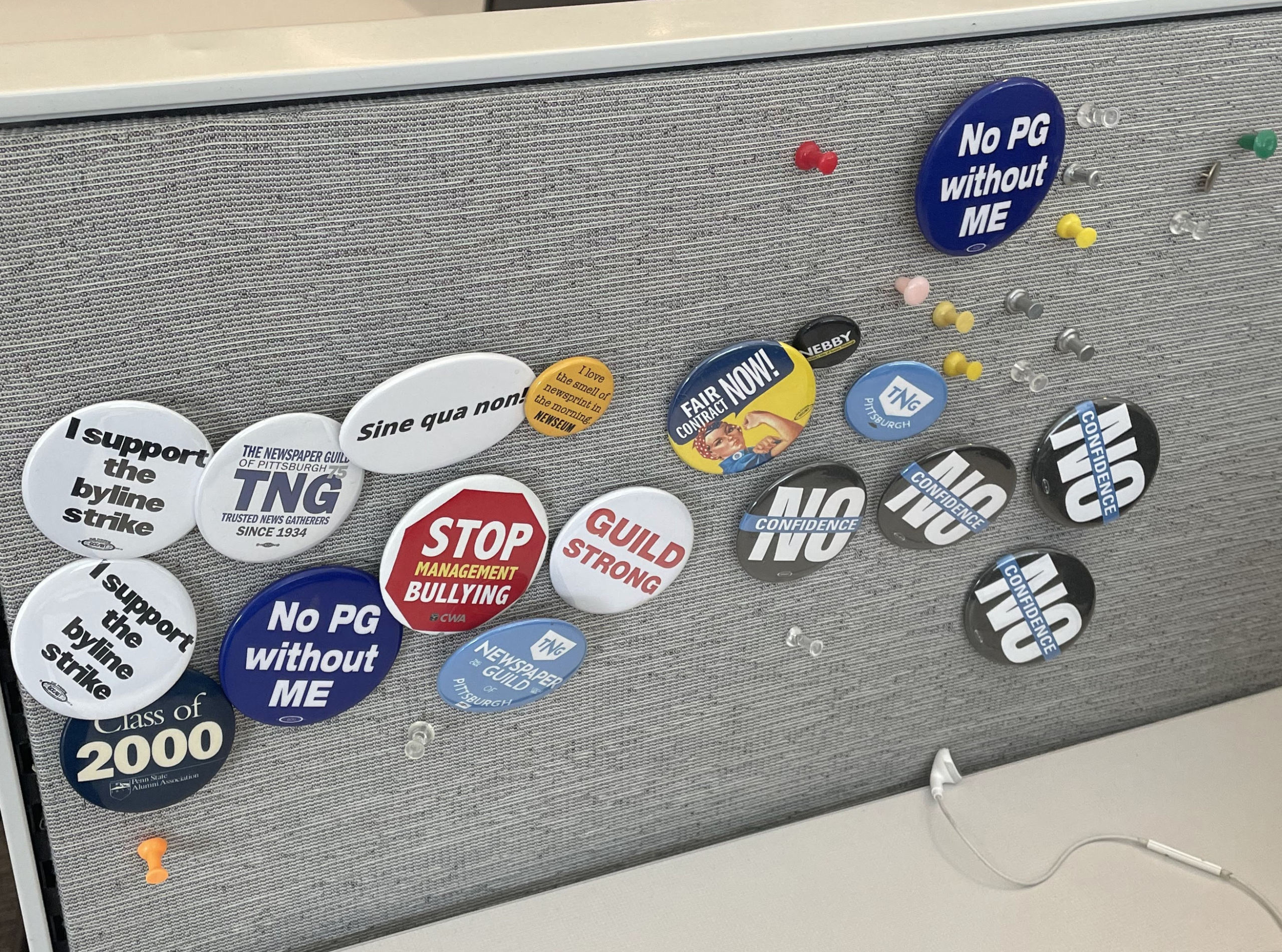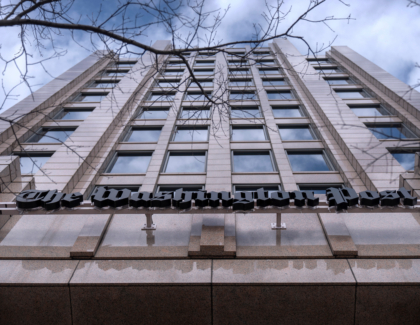Sign up for the daily CJR newsletter.
On February 9, 2019, at about 10pm, near the end of a Saturday night shift, John Robinson Block, one of the owners of the Toledo Blade and Pittsburgh Post-Gazette, came into the Post-Gazette newsroom on the second floor of a building on Pittsburgh’s North Shore.
According to reporters present that night, he appeared both intoxicated and enraged. His young daughter was with him. He headed for a sign that the Pittsburgh Post-Gazette Guild had hung prominently in the main hub of the newsroom, which read shame on the blocks! in large black lettering, with the word shame in bright red. The guild has been involved in protracted contract negotiations with the Block family and has filed over a dozen complaints to the National Labor Relations Board over the past five years for unfair labor practices.
Block, who also serves as the paper’s publisher and editor in chief, approached a photo editor on duty. He asked the editor to take a picture of him and his daughter in front of the sign. When his daughter, who had begun to cry, said she didn’t want to, Block responded, according to Post-Gazette reporter Andrew Goldstein, “Do you want to be high class or low class? You’re a Block, you’re one of us! You have to learn how to lead!”
As an HR manager approached Block, Block began to scream “Get rid of it” and repeatedly slapped, kicked, and punched the sign while also threatening to fire the HR manager. Block left an hour later.
Things have only gotten worse since then. Fifteen current and former staffers from the Post-Gazette and the Blade said in interviews with CJR that conditions at the two Block-owned publications have deteriorated since the incident in 2019. The two papers have seen mass resignations, labor lawsuits, and running disputes in which the newsroom and the owners accuse each other of political bias. The guilds for the two newsrooms told me that, as of 2021, out of 238 members, about 94 had left. Some 27 of those were reporters.
“We’re treated like mushrooms,” Ed Blazina, Post-Gazette transportation reporter and former local news editor, said. “Kept in the dark and tossed crap on.”
John Block and I first talked in the climate-controlled rare-book room of his Shadyside mansion. Block, in a purple dress shirt, trousers, and leather shoes, apologized for the high humidity. A part on the air-conditioning unit had broken, he said, and should have been fixed by now. Frequently, as Block talked, he pulled books from the shelves.
Unlike Block’s father, who had a career as a chemist and considered the newspaper business more of an obligation than something he genuinely enjoyed, Block took an interest in journalism when Watergate broke and reporting was increasingly seen as a noble pursuit.
“The last thing my father was ever going to do was to tell his sons what they were to do with their lives,” Block said. “He always said that because he had ordered us not to be interested, I was.”
He is unapologetic about exercising editorial control. During the interview, he received several text messages about his girlfriend’s car, which had been towed days earlier at a cost of $180. They were sure that she had been legally parked. So they decided to investigate, and found, through security footage, that police officers had changed the parking signs without the appropriate notice.
“There’s one school of thought that if you’re editing a newspaper, where you can control it, anything about yourself that you’re involved in should not be included. On the other hand,” he said, “I’ve always operated with ‘Go with what you know.’ The fact that I am in a position to have a little story—won’t be huge, won’t be front page or anything—but the little story, we can show the image from the camera of them taking the sign, and they’re nailed.”
I asked Block if he felt this approach caused tension between him and his reporters. He said no regrets sprang immediately to mind. “I get along great with the people who want to get along with me,” he said. “And in recent times, you know, some people don’t want to be my friend, which is fine. But it’s not about popularity. It’s about…” he trailed off. “I hope that people respect me.”
He pointed out that he tries to meet every new reporter at the paper, and that many of those who had left had returned. “They come back because we’re committed to journalism, and after they’ve been elsewhere, they know it.”
He declined to discuss the labor disputes in detail, citing the ongoing litigation with the NLRB. He flipped back and forth in what he did say. First, the guild was home to “malcontents” throughout history, “who were wanting to come in and grieve the fact that their mother didn’t love them when they were five.” Then, later, he said he has “a lot of respect for the guild when they’re representing the interests of their workforce. They’re going to keep me on my toes all the time.”
The fundamental issue, he said, is that newspapers are no longer profitable. But Block said he would never consider selling the papers. “It’s just what we do,” he said. Still, he added later, “I may have a twin brother who disagrees.”
Block Communications was founded in 1900 by German Jewish immigrant Paul Block as an ad representation firm that sold advertising to newspapers. It has since expanded to own the Blade and Post-Gazette as well as four cable networks and six broadcast stations, among other endeavors.
It has remained a family business. Until the late 1980s, William Block Sr. was a popular and respected chairman of the company and publisher of the two papers. And then John and his brother Allan took over.
During their tenure, the Post-Gazette has won two Pulitzer Prizes, most recently in 2019; the Blade won one in 2004. But reporters told me that, while they are often proud of the work they produce, it disguises a constant tension with management.
In 2019, John Block had a reporter write a piece about his attendance at the Kentucky Derby and a subsequent celebration that he hosted. In 2008, when he installed a streetlight outside of his Shadyside house, the newspaper covered it, without mentioning he was its publisher. He was referred to as the “safety-conscious man who dreamed up this unique system.”
And as Donald Trump divided America, he divided the newsroom, too. Liz Skalka, a former politics reporter for the Blade, noticed that top editors changed the wording of some of her pieces about Trump. In one August 2021 article, for example, an editor removed the word “false” from “false claims of widespread election fraud.”
Sarah Elms, former City Hall reporter at the Blade, said editors started to self-censor after years of the Blocks calling editors for last-minute changes to articles. “I think they just kind of know,” she said.
In July 2018, Susan Allan Block, who is married to Allan Block, wrote on Facebook that she could “care less about ‘saving the Blade.’ We run it like a charity for the benefit of the community,” Block added. “It’s way more trouble than it’s worth.”
“That all trickles down,” said Allison Dunn, a former court reporter at the Blade. Reporters at both publications have been involved in bargaining with the Blocks for a new contract since March 2017 and have not had a pay raise for the past fifteen years.
“The Blocks have some sort of animosity against the workforce,” Zack Tanner, president of the Post-Gazette Guild, told me as he described a contract proposal that he characterized as slashing pay, health insurance, and pensions. “I can’t imagine that they’d be treating us this way otherwise.” The NLRB recently issued a complaint against BCI and the Post-Gazette for bad-faith bargaining and improper conduct in contract talks. A hearing is scheduled for September.
Joseph Landsberger, current head of the Toledo Blade Guild, agreed. “Toledo deserves to have experienced journalists covering their community and holding their leaders to account, but in order for this to work, journalists have to be able to make a living wage,” he said. “That used to be the case at the Blade, but it simply isn’t any longer.”
“All of us were planning on staying there until we die,” Dunn said. “But we all left this year. I just felt like the situation had gotten to the point where it was out of my control, and I just wasn’t enjoying myself anymore.”
Jason Webber, features writer and vice president of the Toledo Blade Guild, attributed the current demoralization at the paper to the state of the world more broadly. “I think it’s this us-versus-them mentality that has led to this gigantic stalemate,” he told me.
And others like Nolan Rosenkrans, a former reporter at the Blade and former head of the Toledo News Guild, differentiated between the two brothers in terms of their attitude toward the papers and employees. Allan, he said, was a “driving force” for many of the contractual battles occurring at the two publications, with John only playing “a part” in the decision-making.
“There would be major value if other members of the family decide to work together and shift things away from Allan,” Rosenkrans added.
I spoke to Allan by phone. He confirmed that he and his brother often differ. To him, he said, Block Communications “is not primarily a newspaper company anymore,” and, though he thinks that the newspaper business as a whole should survive, “many journalists today are biased and not independent.”
He cited a story that had received airtime on Fox News, Newsmax, and One America Network, but not in more mainstream publications—an allegation, often presented with little evidence, that Hunter Biden had received large payments from what Block described as “the Chinese, Ukrainian, Russians, and Kazakhs”—as an example of that bias.
He called the Post-Gazette a “hard-left organ” and referred to his reporters wanting to “lead the revolution.” The easiest thing to do, he said, would be to discontinue the papers, though that would not be in the interests of the two cities.
Neither he nor his brother specified what their plan to improve matters might be. John called the hedge funds buying much of local media organizations “bone pickers” and “buzzards there to harvest the last of the goodwill.” But he said nonprofits weren’t an option either due to the donor and government influence that such arrangements could entail. Rather, he said, the costs of the newspaper business need to be fully borne by both the consumers and advertising.
“We had some good times in the past, for a long time a business model that worked,” Block said. “Now we have to reinvent it a bit.”
Has America ever needed a media defender more than now? Help us by joining CJR today.







